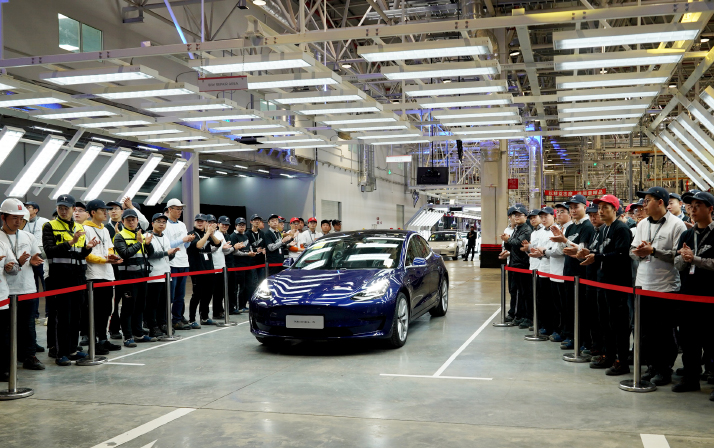|
||||||||||
| Home Nation World Business Opinion Lifestyle ChinAfrica Multimedia Columnists Documents Special Reports |
|
||||||||||
| Home Nation World Business Opinion Lifestyle ChinAfrica Multimedia Columnists Documents Special Reports |
| ChinAfrica |
| Improving Business Climate |
| Implementation of the Foreign Investment Law improves Chinese business environment, reassures investors |
| By Ge Lijun | VOL.12 February ·2020-02-13 |

On December 30, 2019, the first batch of 15 Tesla Model 3 cars made in China is officially delivered to customers (XINHUA)
A year. That's all Tesla needed to set up its "super factory" in Shanghai and deliver the vehicles.
On January 7, 2019, Tesla began working on its gigafactory in Shanghai. It is the company's first overseas plant of its kind and the first fully foreign-owned vehicle manufacturing project in China. On December 30, the first batch of 15 Tesla Model 3s made at the factory was delivered to customers.
"During this process, we really felt the changes in the business environment in China and some of the efforts made by the Chinese Government to improve the business environment," said Tao Lin, Global Vice President of Tesla.
In fact, in less than a year, China has successively reviewed, approved, and promulgated the Foreign Investment Law and its implementing regulations. The adoption of the law during the second session of the 13th National People's Congress, China's highest legislative body, shows the country's determination to open up more to foreign companies and to alleviate the concerns of foreign investors. The law, which came into force on January 1 this year, now provides a new legal guarantee for a more equitable foreign-investment climate.
Continuous improvement
Since the beginning of the reform and opening up in 1978, three laws have been adopted to manage foreign investment in China: the law on joint ventures between Chinese and foreign capital, the law on Sino-foreign contractual joint ventures and the law on foreign-owned companies. But as the Chinese economy has developed over the years, these laws seem to be outdated.
With the Chinese economy entering a high-quality development stage, traditional comparative advantages such as labor and land costs have declined. "Foreign-owned companies want equal treatment as domestic companies in terms of market access, competition and policy enforcement, in order to reduce the institutional costs," said Li Dawei, researcher of the Chinese Institute of Macroeconomics.
It should be noted that the Business Environment Optimization Regulation is also implemented along with the Foreign Investment Law and the law's implementing regulations. "The regulation aims to create a users' guide applicable to all market players and to address common problems concerning the business environment," said Kong Qingjiang, Dean of the School of International Law at the Chinese University of Political Science and Law.
Chinese and foreign companies are entitled to fair treatment in terms of government funding, land supply, as well as deduction of taxes and fees.
"The entire legislative process has significantly boosted the confidence of foreign companies, including Dell," said Huang Chenhong, Global Executive Vice President of Dell Technology Group and President of Dell Greater China Region.
The increasing transparency of the business environment has greatly benefited foreign companies in China, leading to more investments by foreign businesses. According to statistics from the Chinese Ministry of Commerce, in the first 11 months of 2019, 36,747 enterprises with foreign capital were created nationwide, and the amount of utilized foreign capital was 845.94 billion yuan ($122.9 billion), a 6.0 percent year-on-year increase.
In addition to Tesla's gigafactory in Shanghai, other big projects, such as the Cummins engine project in Hefei, Anhui Province, the BASF project in Zhanjiang, Guangdong Province, and the Swiss Inex Chemical project in Ningbo, Zhejiang Province, have also been launched. According to the Commerce Ministry, there were 722 major projects with foreign investment of each more than $100 million in the first 11 months of 2019, an increase of 15.5 percent, showing the attractiveness of the huge Chinese market.
"There have not been many opportunities for South African companies to invest in China. But coming here and chatting with people, I see examples of South African companies getting involved in China," Wendyl Martin, Editor of the South African weekly Weekend Argus Sunday, told ChinAfrica.
In fact, South African investment in China can be found in the energy and oil sector, through the public company of Sasol, and in media companies such as Tencent. "Thanks to the investment of Naspers and Koos Bekker [CEO of Naspers], we have a gigantic platform, WeChat, used by millions of Chinese. I think that with the entry into force of this law, we will see more and more investment from South Africa and hopefully in the media field as well," he said.

Tanzania participates in the Second China International Import Expo in Shanghai in November 2019 (WEI YAO)
Better protected, more open
The protection of intellectual property rights has always been at the heart of the concerns of foreign investors. The enactment of the Foreign Investment Law is a positive response.
It is forbidden to force, whether by administrative authorization or sanction or in disguised form, foreign companies and investors to transfer their technology, according to the implementing regulations.
"The implementation of the law demonstrates the will of the Chinese Government to protect intellectual property rights and to fight against infringements. My company is currently conducting business in China. The law will help us bring more capital to the country," said Kobus van der Wath, CEO of the South African multinational The Beijing Axis, who has introduced many African companies to do business in China during the past decade.
In recent years, China has strengthened the protection of intellectual property rights of foreign-owned enterprises, and even set up a national intellectual property protection center in 2016. Great attention was also paid to the issue during the legislation process of the Foreign Investment Law.
From a Chinese perspective, the law will further enhance China's openness to the outside world, according to some experts.
Over the past 40 years, more and more measures have been adopted to let the market play a bigger role in allocating resources. "The introduction of the law is driven by national considerations and, together with the negative list management system, will help China take advantage of the resources available in domestic and international market," explained Justin Yifu Lin, Dean of the Institute for New Structural Economics at Peking University.
"The approval of the implementing regulations illustrates our resolution to attract foreign investment and widen openness," said Chinese Premier Li Keqiang at an executive meeting of the State Council on December 12, 2019, at which the protocol of the regulations on the application of the Foreign Investment Law was approved.
(Comments to glj@chinafrica.cn)
|
||||||||||||
| About Us | Contact Us | Advertise with Us | Subscribe |
| Copyright Beijing Review All rights reserved 京ICP备08005356号-5 京公网安备110102005860号 |